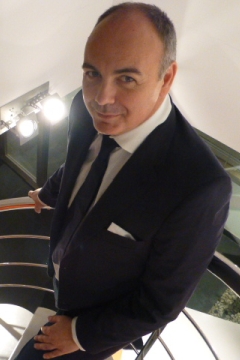
It is a pleasure to welcome you to the Berlanga Film Museum, a space dedicated to the figure of the great Spanish film maker Luis García Berlanga, a lifelong master, and a friend from 1992 until his decease, in November 2010.
When the Generalitat Valenciana (Valencian Regional Government) asked me, through the IVAC (Valencian Institute of Cinematography and Audiovisual), to suggest and structure the contents of a digital platform to spread the figure of Luis García Berlanga internationally, my gratitude, my excitement and the enormous responsibility stimulated the process. At this point I would also like to express my gratitude to Luis García Berlanga’s family for their confidence in me and their constant display of affection. And here is the result: a space which intends to establish the universal dimension of one of the greatest names of the Spanish culture of the 20th century.
The idea for a museum came immediately. The most important objective was for this virtual space to offer the variety of pieces which make up Berlanga’s rich personality. His films, the projects he could not carry out, his experiences and his thinking are as important as his expression to get to know him: his expression as a film maker and his expression as a person. Because it is not often that Count de Buffon’s maxim, which claims the style is the man himself, is as clearly defined as in Berlanga: his very personal cinematographic form reflects the flow of his thoughts, the links between them, their own structure. I am absolutely convinced that his famous use of the sequence shot is a result of both his intellectual process and his character and personal philosophy.
Luis García Berlanga is to his time what Quevedo, Goya and Valle Inclán were to their own time. But, just as they did before, he goes beyond his own historical context with his ability to talk about Spain, and through it, about everything that is universal, in a constant present, to the spectator of any time. Berlanga’s ability to portray the Spanish society through its daily miseries and trivialities, make him get much closer to a people who wish to see themselves on that Berlanguian mirror full of humour. Berlanga’s art is the expression of one of the freer and more independent spirits in the Spanish cultural life of all times.
The Berlanga Film Museum wants to be a space open to both experts from the most varied disciplines and the most ordinary user, just like Berlanga’s own work is. And, although we are publishing it with contents that we think are greatly relevant, it is important to point out that this site is an ongoing project which will be enriched both with pieces of work and in its structure as we walk along the path we have started together, because we have no doubts the users themselves will help us to rise to such an ambitious objective.
So, we encourage you to surf this site with Berlanguian freedom, to organize your own sequence shot to move from one area to the other as you please, and resort to mentioning the Austro-Hungarian when you see fit to do so. And I hope we manage, as much as possible, to make sure your visits help you to get to know and enjoy Luis, a privilege which will enable you to understand Berlanga’s reasons.
Rafael Maluenda
He meets Luis García Berlanga in 1992, and starts a close friendship which will last until Berlanga’s decease. Professionally speaking, he collaborates in the direction teams of “Todos a la cárcel” (“Everybody to Jail”) (1993), “Blasco Ibáñez” (1997) and “París Tombuctú” (“Paris-Timbuktu”) (1999), as well as in the only theatre play directed by Berlanga, “Tres forasters de Madrid” (“Three Foreigners from Madrid”) (1995), by Eduardo Escalante.
He has written the screenplays for “El hijo de la lluvia” (“The Son of the Rain”), and “Berlanga, una brecha de libertad” (“Berlanga, a break for freedom”), both fiction films on the preproduction stage, among others. He wrote and directed the shorts “Juego de llaves” (“The Keyring Game”) (1995) and “Demasiado Tarde” (“Too Late”) (1998).
Rafael Maluenda has been a member of the panel in many national and international film festivals and a speaker in conferences, seminars and festivals, as well as in teaching and cultural activities organized by universities and film archives.
He has been the director of the Festival Internacional de Cine de Valencia – Cinema Jove (Valencia International Film Festival- Cinema Jove) since 2000 to 2015.






